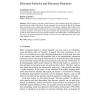Free Online Productivity Tools
i2Speak
i2Symbol
i2OCR
iTex2Img
iWeb2Print
iWeb2Shot
i2Type
iPdf2Split
iPdf2Merge
i2Bopomofo
i2Arabic
i2Style
i2Image
i2PDF
iLatex2Rtf
Sci2ools
85
Voted
MT
2000
2000
Discourse Particles and Discourse Functions
Spoken language, especially spoken German, is rich in particles that do not contribute to the propositional content of utterances, but play important roles in steering the flow of the dialogue and in conveying various attitudes and expectations of the speaker. Languages differ widely in their conventions on particle usage, and therefore these words pose significant problems for translation. As a solution, we propose an inventory of "discourse functions" that characterize the pragmatic impact of particles. These functions are to be assigned to particles in the analysis phase, so that the translation use the abstract information to decide on the best way of rendering the same effect in the target-language utterance. Key words: dialogue, particles, pragmatics
Related Content
| Added | 19 Dec 2010 |
| Updated | 19 Dec 2010 |
| Type | Journal |
| Year | 2000 |
| Where | MT |
| Authors | Manfred Stede, Birte Schmitz |
Comments (0)

